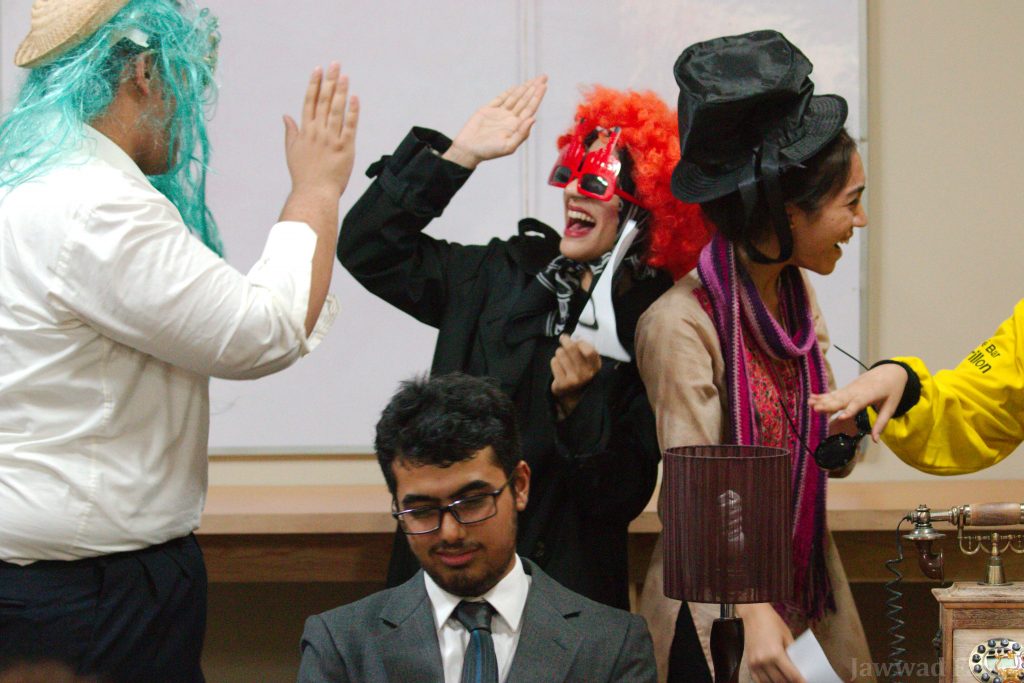
It was a small room that could fit four rows of chairs length wise, three across. A makeshift stage had been set in the front by pushing the furniture aside. A class room, you thought automatically. Whiteboard, projector, sitting tables. You could tell it had been turned into a stage by the props laid out in the room. A cradled phone, a glass of beverage and a mottled cigar.
Nobody was going to write a review for this show in tomorrow’s Dawn. Scenes from the God Father, Monty Python, and two Urdu plays were on the menu. An afternoon had been set aside to perform and yes a performance was expected. We could feel the anticipation as we stepped inside the room and pulled the sliding door closed behind us.
There were just a few of us in there trying to grab a seat without stepping on toes or getting in each other’s way. Two sets of proud parents, three heads of grey hair, two wild mops, one not. Student counselors, teachers and Seeret who had trained the group of six teenage stars.

In the front row four seats had been reserved for judges. Stage, television and film stars, one well respected director and a universally loved senior instructor of performing arts from NAPA. They would judge the performances and provide feedback on all four scenes to the actors. Seeret did a quick introduction touching upon how this specific group of students had started with seventeen aspiring actors and after four weeks of casualties only six had remained.
The best six, she said. Naturally talented, committed, earnest, never did stage in their prior lives, destined for greatness, possibly theater, maybe more but here now to entertain and impress. Four performances. Four directors. Four set changes. Six actors. 12 days of rehearsals, of melt downs, nervous breakdowns and crying. This course was not about just acting – it was about all flavors of stage from directing, production and dialog to cleaning up backstage. To some extent also life because what else is stage if not a mirror of what we live through every day. But like life theater too is hard.
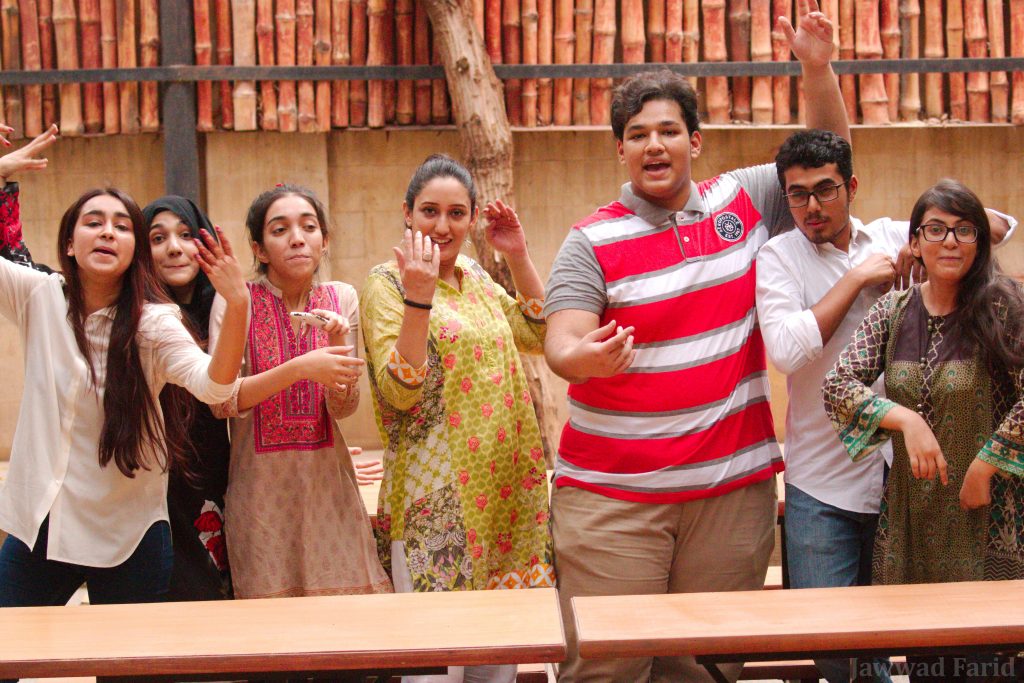
Be gentle with my children, she said, I have grown to really love them.

The performances came on stage like clockwork. Seeret would set the mark, “And scene”, the back stage door would open and the kids would step into the room. The opening scene from Godfather where a Don Corleone doppelganger smoked a cigar and listened to a plea for help from a mother. A snip from Monty Python, two scenes from recent Urdu plays. One light, one intense.
Twenty minutes and we were done. Pleased, surprised and amused. Impressed that six teenagers could pick so much about stage in just 12 sessions.
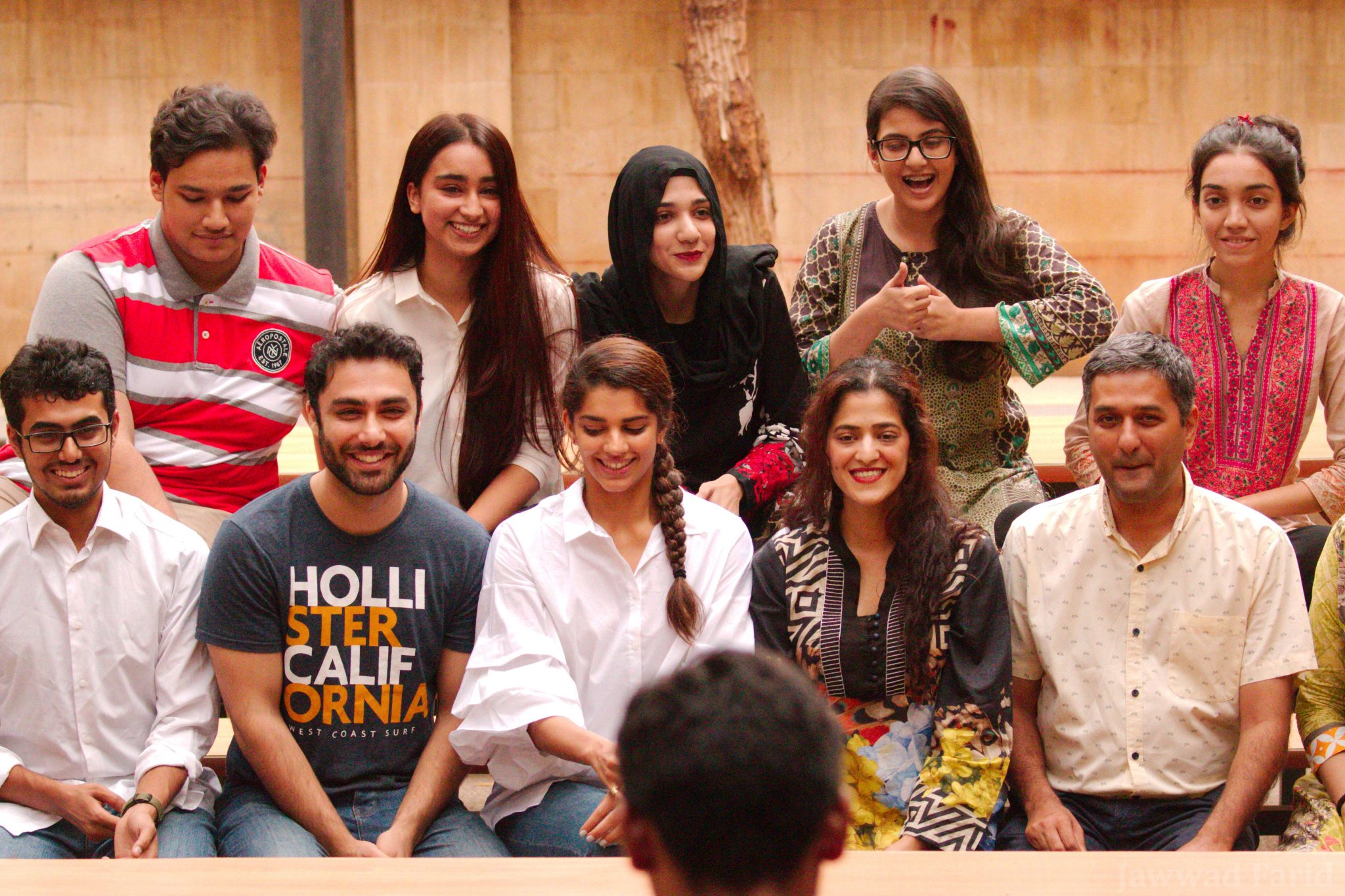
Of the judges Nida Butt spoke first. Observing half a dozen seventeen and eighteen year olds getting feedback from a nationally acclaimed director was a treat for all theater lovers in the audience. Nida cut across all aspects of their performance – eye contact, foot work, voice modulation, the power of being still and calm, of being one with the character, of making us, the audience, believe. Of directors and the magic of theater.
Then she moved on to the future. About the importance of going to school to learn and practice the art or not going to school and picking up the craft in the trenches.
Sanam Saeed and Ali Ahmed followed with their reviews and two pieces of advice. Do you want to be a star or an actor? Do you know the difference? Doing stage for the love of the craft or for attention, fame and coverage. Champions are made in off season. Take good care of yourself when you are not on stage, when you are down and out, not rehearsing.
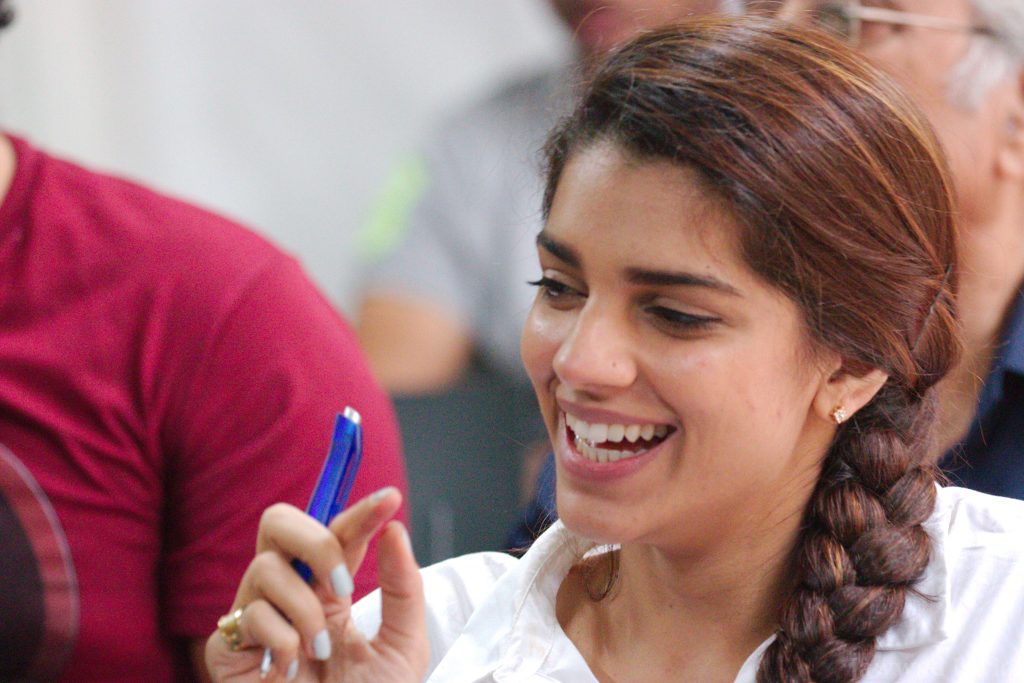
Zain Ahmed spoke about following your heart and the ability of theater to pay your bills. It doesn’t matter what profession you pick you will always struggle for the first few years. If you persist and are good at what you do you will rise. Once again it doesn’t matter what you do, if you are good, you will make your own space you will figure it out, you will get paid. Yes its tough and quite rough in the early years, but so is everything else in life. You might as well do something you like and care about.

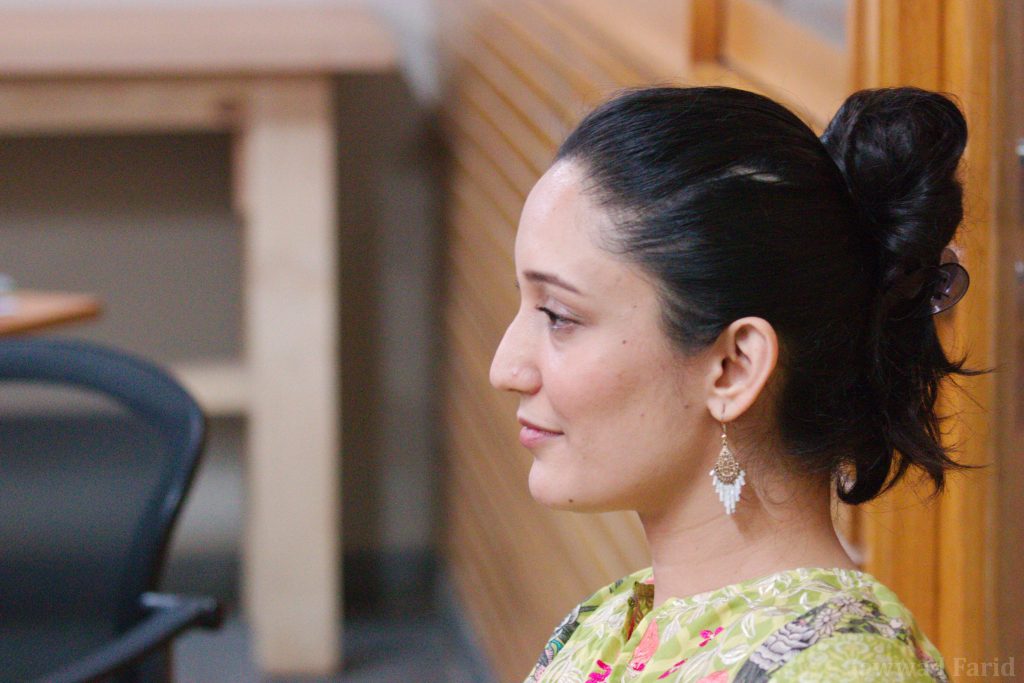
Seeret’s efforts to teach art and theater to O and A level high school students is not something new. With the arrival of NAPA, the arts council theater and amphitheater the performing arts scene in Karachi has changed dramatically. Previously limited to a play every few months on the PACC stage we are now seeing performances pop up every few weeks. Adaptations, comedies, improv and standup open mike nights. Faheem Ahmed’s comedy scene runs a show every alternate week, putting up new content and new artists, getting them much needed exposure, practice and confidence. Junaid Iqbal’s Salt Arts tries to take budding artists and turn them into brands.
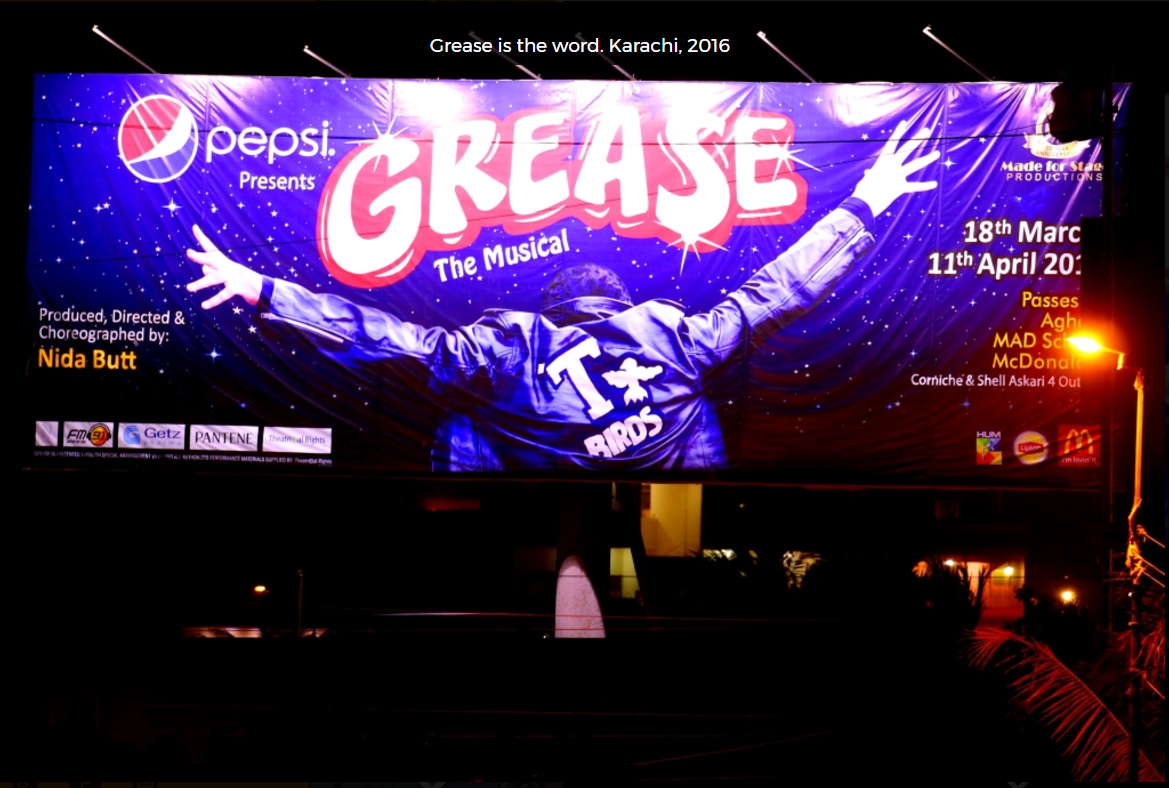
This revival of the art scene points to a fundamental shift in social thinking. There is now a growing opportunity, if you are interested, to explore performing arts in Karachi. Even if you don’t do it full time there is a small collection of teams and groups dedicated to bringing at least one large scale stage performance to the city every few months. What started off as a mostly underground movement two decades ago is now a fledgling community. For a young artist it is still difficult to survive and break through. There are active support groups creating opportunities for new talent to perform and test their material as frequently as every few week. Audiences are willing to pay to listen to their favorite standup routines. There is room in Karachi’s evenings for light hearted banter and laughter again.
Why is this important you ask? Imagine a society that only produces doctors, engineers, accountants, scientists, consultants, civil servants and business school graduates. A society without art, without music, without drama, without opinion, without expression. No poets, composers, writers, musician or artists. No creativity, no dissent, just group think.
Creative expression indicates that the spirit of our community is alive. Choice, tolerance and expression is what makes communities strong; gives them resilience, energizes them. When we produce individuals who are only happy as outliers, as misfits, as the exceptions who prove the rule, we prove that we have a future. A future because we have a shot at breaking away from being absurd, from being boring and turn into something interesting.
When this group of misfits and trouble makers prospers and grows it indicates that we have understood how important choice is. It indicates that the community is willing to allocate time and resources to feed the desire to explore and support alternate and finer art forms. That we understand what it feels to be alive, to laugh, to connect and enter the world of make believe, to encourage those who wish to amuse. That we have grown beyond the tyranny of daily routine and everyday life and are willing to be tickled, to be entertained. That we are healing and we have finally learned to live again.

What was a pinprick of light a few years ago is growing. Help nurture it by supporting the arts in your community. Pay your own way to a theater performance, an exhibition, a gallery in your neighborhood. Make it a point, take a friend with you. Show up, fill up the seats, lend a helping hand, a sympathetic ear, a should to cry on to a budding artist so that our city can learn to live again.
